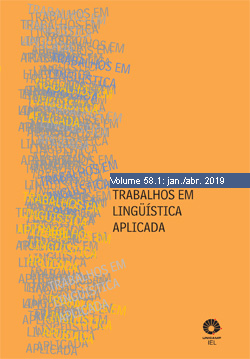Resumo
This special issue of Papers in Applied Linguistics brings together eight articles and an interview that provide a wide range of perspectives on the topic of transnationalism. Much research in applied linguistics highlights the growing importance of globalisation and transnational mobility, but often takes these processes and their effects to be self-evident and self-explanatory (BRIGGS; MCCORMICK & WAY, 2008). As such, this special issue addresses the ways in which transnational movements of populations, linguistic practices, ideology, knowledge and capital shape educational policies and practices related to language. It is concerned with migration, internationalisation of educational provision, student mobility, and global communications.
Referências
APPADURAI, A. Modernity at large: Cultural dimensions of globalization. University of Minneapolis: Minnesota Press, 1996.
BLOMMAERT, J. (2010). The Sociolinguistics of Globalization. Cambridge, UK: Cambridge University Press.
BLOMMAERT, J. (2006) Language ideology. IN: T. Todorov (Ed.) Handbook of Language and Linguistics. Vol. 6, p.510-523. Elsevier.
BRIGGS, L., MCCORMICK, G., & WAY, J. T. (2008). Transnationalism: A category of analysis. American Quarterly, 60(3), p. 625-648.
BYRAM, M. (2008). From Foreign Language Education to education for Intercultural Citizenship: essays and reflections. Clevedon, Bufalo, Toronto: Multilingual Matters.
CARDARELLI, R. (2018). Solving the Education Crisis of Displaced Children: A most important goal for education diplomacy. Childhood Education, Vol. 94, 2018 — Issue 3: A Special Issue on Education Diplomacy, p. 61-66.
CANAGARAJAH, S. (1999). Resisting linguistic imperialism in English teaching. Oxford: Oxford University Press.
CONNELL, R. (2007). Southern theory: The global dynamics of knowledge in social science. Cambridge: Polity.
INTERNATIONAL ORGANIZATION FOR MIGRATION (2018). Global migration indicators. Berlin: Global Migration Data Analysis Centre.
JACQUEMET, M. (2005). Transidiomatic practices: Language and power in the age of globalization. Language & Communication, 25(3), p. 257-277.
KACHRU, B B. (1985). Standards, codification and sociolinguistic realism: the English language in the outer circle. In: QUIRK, Randolph; WIDDOWSON, H. G. (Orgs.). English in the World: Teaching and Learning the Language and Literatures. Cambridge: Cambridge University Press, p. 11-33.
LEEMAN, J., RABIN, L., & ROMÁN-MENDOZA, E. (2011). Identity and activism in heritage language education. The Modern Language Journal, 95(4), p. 481-495.
LILLIS, T. (2017). Resistir regímenes de evaluación en el estudio del escribir: hacia un imaginario enriquecido. Signo y pensamiento, 36(71), p. 66–81.
LILLIS, T. (2013) The Sociolinguistics of Writing. Edinburgh: Edinburgh University Press
LILLIS, T. (1999). Whose “Common Sense”? Essayist literacy and the institutional practice of mystery. In: Jones, C.; Turner, J.; Street, B. (Orgs.). Students writing in the university: cultural and epistemological issues. Amsterdam: John Benjamins, p. 127-148.
MOITA-LOPES, L. P. (2014). Global Portuguese: linguistic ideologies in late modernity. New York: Routledge.
O’BRIEN, S. (2017). Linguistic Diasporas, Narrative and Performance. London: Palgrave
PENNYCOOK, A. (2010). Rethinking origins and localization in global Englishes. In: SAXENA, M.; OMONIYI, T. (Orgs.) Contending with globalization in World Englishes. UK: Multilingual Matters, p. 196-233.
ROSE, H and GALLOWAY, N. (2019). Global Englishes for Language Teaching. Cambridge: Cambridge University Press.
SCHEFFNER HAMMER, C., DUNN DAVISON, M., LAWRENCE, F. and MICCIO, A (2009). The effect of maternal language on bilingual children’s Vocabulary and emergent literacy development during Head Start and Kindergarten. Scientific Studies of Reading 13, no. 2, p. 99–121.
SILVA, Daniel Nascimento. (2016). Comunicando a -pacificação- e a violência. Signotica (UFG), v. 28, p. 405-431.
UNITED NATIONS DEPARTMENT FOR ECONOMIC AND SOCIAL AFFAIRS. (2017). International Migration Report: Highlights. New York: United Nations
VERVOTEC, S. (2007). Super-diversity and its implications. Ethnic and racial studies, 30 (6), p. 1024 – 1054.
WINDLE, J. A.; NOGUEIRA, M. A. (2015). The role of internationalisation in the schooling of Brazilian elites: distinctions between two class fractions. British Journal of Sociology of Education, v. 36, n. 1, p. 174-192.
WYN SIENCYN, S. (2019). Early years’ provision for young children in Wales: history, challenges, and the Welsh language” Teanga Special Issue: Multilingualism in the Early Childhood Years, 10, 10, 2019
O periódico Trabalhos em Linguística Aplicada utiliza a licença do Creative Commons (CC), preservando assim, a integridade dos artigos em ambiente de acesso aberto, em que:
- A publicação se reserva o direito de efetuar, nos originais, alterações de ordem normativa, ortográfica e gramatical, com vistas a manter o padrão culto da língua, respeitando, porém, o estilo dos autores;
- Os originais não serão devolvidos aos autores;
- Os autores mantêm os direitos totais sobre seus trabalhos publicados na Trabalhos de Linguística Aplicada, ficando sua reimpressão total ou parcial, depósito ou republicação sujeita à indicação de primeira publicação na revista, por meio da licença CC-BY;
- Deve ser consignada a fonte de publicação original;
- As opiniões emitidas pelos autores dos artigos são de sua exclusiva responsabilidade.


